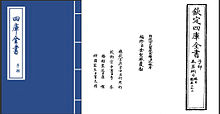Compendium of Materia Medica

The Siku Quanshu edition of the Compendium of Materia Medica
|
|||||||||
| Traditional Chinese | 本草綱目 | ||||||||
|---|---|---|---|---|---|---|---|---|---|
| Simplified Chinese | 本草纲目 | ||||||||
| Literal meaning | Principles and Species of Roots and Herbs | ||||||||
|
|||||||||
| Transcriptions | |
|---|---|
| Standard Mandarin | |
| Hanyu Pinyin | Běncǎo Gāngmù |
| Wade–Giles | Pen3-ts'ao3 Kang1-mu4 |
The Compendium of Materia Medica, also known by the romanizations Bencao Gangmu or Pen-tsao Kang-mu, is a Chinese materia medica work written by Li Shizhen during the Ming dynasty. It is a work epitomizing the materia medica known at the time. The Compendium of Materia Medica is regarded as the most complete and comprehensive medical book ever written in the history of traditional Chinese medicine. It lists all the plants, animals, minerals, and other items that were believed to have medicinal properties.
The text consists of 1,892 entries, each entry with its own name called a gang. The mu in the title refers to the synonyms of each name.
The British historian of Chinese science Joseph Needham calls Li Shizhen "the 'uncrowned king' of Chinese naturalists", and his Bencao gangmu "undoubtedly the greatest scientific achievement of the Ming".
The title, translated as "Materia Medica, Arranged according to Drug Descriptions and Technical Aspects", uses two Chinese compounds. Bencao (Pen-tsao; "roots and herbs; based on herbs, pharmacopeia, materia medica") combines ben (pen; "root; origin; basis") and cao (tsao; "grass; plant; herb"). Gangmu (Kang-mu; "detailed outline; table of contents") combines gang (kang; "main rope, hawser; main threads, essential principles") and mu ( "eye; look; category, division").
The characters and were later used as "class" and "order", respectively, in biological classification.
Li Shizhen completed the first draft of the text in 1578, after conducting readings of 800 other medical reference books and carrying out 30 years of field study. For this and many other achievements, Li Shizhen is compared to Shennong, a god in Chinese mythology who gave instruction on agriculture and herbal medicine.
...
Wikipedia
